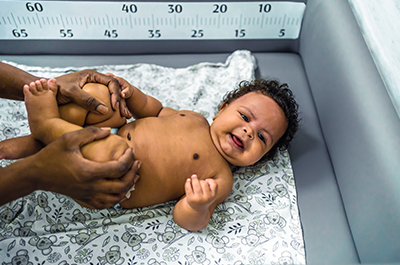Reflux is remarkably common among babies. In fact, more than half of all babies will have some level of reflux. Some spit up after eating. They may burp a little too much. Sometimes they're just irritable after feedings. But what is reflux, really?
Infant reflux happens when food backs up (refluxes) into the esophagus from the stomach. It can happen several times a day, even in healthy infants. As long as your baby is healthy, happy and growing appropriately, reflux is rarely problematic.
Babies with gastroesophageal reflux disease, or GERD, on the other hand, spit up frequently. They're fussy, irritable and may arch their backs in pain.
Infant Reflux Explained
Reflux happens when the lower esophageal sphincter muscle does not close tightly after liquids enter the stomach. The esophagus sits above the band and the stomach lies at the bottom. If the sphincter doesn't close completely, stomach contents and digestive juices can travel back up toward the esophagus. That's when babies run into problems.
In newborns, that sphincter is like a loose rubber band, especially among babies born prematurely. Children who have developmental issues or who are born with a naturally loose esophageal sphincter are more vulnerable to reflux.
Most infants outgrow reflux by 18 months of age. However, if your child has GERD, they may experience respiratory symptoms including coughing and choking. They might even breathe in their own gastric contents. And those symptoms and side effects can last well past their second birthday.
Ways To Help Prevent or Manage Your Baby's Reflux
Reflux tends to peak around four to six months and then improve. The reason: Older babies start eating solid foods and consume less liquid — and solids are easier to keep down. But reflux isn't something babies just have to live with until they grow older.
There are things parents and caregivers can do to help ease tummy troubles associated with reflux. Common strategies include:
- Burping frequently: Instead of waiting until your child reaches the end of the bottle, try burping after each ounce of milk or formula.
- Placing the child upright for feeding: You should never feed a baby while she's lying down. Instead, make sure she's at a 45-degree angle, which helps ensure milk flows down the esophagus and into her tummy.
- Keeping the child upright after eating: Wait at least 30 minutes after a meal before lying your baby down. That upright position will help the stomach do its job of digestion.
- Not overfeeding: Be careful not to overfeed your baby. When you're boosting intake to meet your baby's needs, be sure to increase the amount by only half an ounce to an ounce at a time.
- Thickening the milk or formula: In severe cases, your doctor may recommend thickening formula or breast milk with cereal. Common recommendations include one teaspoon of cereal for every ounce or two of milk. Some formula brands even come already thickened with rice cereal, so you don't have to do the mixing. The consistency of these premade formulas tends to be smoother, too.
Most importantly, be attentive to any signs of discomfort and distress and watch your child carefully for signs of a growth delay. While symptoms of GERD vary, you should schedule an appointment with your child's pediatrician if you notice any of the following in your baby:
- Issues gaining weight
- Forceful spit up or projectile vomit
- Spit up is green, yellow, bloody or looks like coffee grounds
- Refusal to eat
- Bloody stool
- Difficulty breathing, gags or chokes during feedings
- Irritable after eating
- Arches his back or screams during feedings
Parents of babies with reflux may be concerned about their child spitting up while sleeping. But even refluxy babies should be placed on their backs without any pillows, props or wedges during naps and bedtime. Babies with reflux will naturally turn their heads to one side if they need to spit up. Placing babies on their bellies and putting extraneous items in the crib both increase the risk of sudden infant death syndrome (SIDS) and sleep-related death.
To find a doctor or pediatrician at Henry Ford, visit henryford.com or call 1-800-HENRYFORD (436-7936).
Stacy Leatherwood Cannon, M.D., is a board-certified pediatrician and the physician champion for childhood wellness for Henry Ford LiveWell. She sees patients at Henry Ford Medical Centers in midtown Detroit and Sterling Heights. Learn more about Dr. Leatherwood Cannon.



